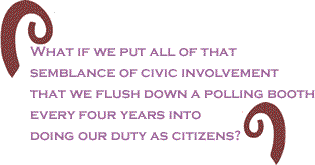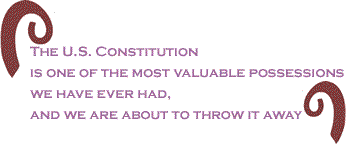
|
|||||||||||||||||||||
|
||||||||||
|
||||||||||
The current issue is always free to everyone If
you need the access available to a |
||||||||||

|
||||||||||
 |
||||||||||
|
Remarks on October 6, 2007, at a rally in Richmond, Va., celebrating the U.S. Constitution and flag. There have always been those in the antiwar movement who believed that if Congress finally found the nerve to stop funding the occupation of Iraq, Bush and Cheney would actually pull out. Those still clinging to this faith can be found among those who understand that Congress does indeed have the power to simply stop funding the occupation, as well as among those who believe the pervasive lie that you can't end an occupation without passing a bill and overriding a veto. Let's all get straight really quickly on two things: First, if Nancy Pelosi and/ or Harry Reid can find the courage and decency to do it, they will simply announce an end to the occupation and not bring up any more bills to fund it. Second, if this happens, the occupation will no longer be legally funded, but Bush and Cheney will take money illegally from elsewhere to keep it going, just as they did to start it in the first place. Now, a great many people, whether they understand the power Congressional leaders have or not, have given up hope on the particular so-called leaders we're stuck with for the next 15 months. They have, in fact, placed their hopes for ending the occupation of Iraq on electing a new president. Raise your hand if you've already spotted the weak point in that plan. That's right, the next president is likely to keep the occupation going. All of the Republican candidates, other than Ron Paul, plan to keep it going, and if the Democrats spend the next year refusing to end the occupation or impeach anybody, do you think the public will never catch on to their game of passing bills destined to be vetoed and then whining about the vetoes? Are you so sure a Republican won't win or steal the White House in November 2008? Among the Democrats, Clinton, Obama, and Edwards refuse to commit to ending the occupation by 2013. Clinton has said she'll keep it going through 2017. So, we're looking at the distinct possibility of electing a president who continues an illegal occupation indefinitely. If that president is a Republican, the Congress will likely also be more Republican, and the Senate, if not the House, may have a Republican majority. If one or both houses are still Democratic and the leadership decides to finally lead, the new Republican president will probably keep the occupation going illegally. We will then be smack up against the already present need to start impeachment. And the Democrats will resist it even more fiercely, because resisting it will have already lost them an election. When something fails for the Democrats, they pursue the same strategy only more so. If the new president in 2009 is a Democrat who wants to keep the occupation going, a Democratic Congress won't try to end it, and a Republican Congress probably won't either. And it is pretty unlikely America will elect a Democratic president and a Republican Congress next year. If the new president is a Democrat who wants to keep the occupation going, all the money in the professional pseudo-anti-war movement will dry up. The war will become a respectable humanitarian genocide with no end in sight. And we'll be up against the need to impeach a Democrat for the same crime for which we refused to impeach a Republican.
With no promising outlook for 2009, one thing is clear, it would be very much to the good if we could figure out something to do now, in the next 14 months, something to change the direction, something we haven't done before or something we haven't done before with sufficient intensity to make it work. At stake is the continuation of at least one war, the potential launching of new wars, and the outlaw presidency's ongoing power to spy without warrant, detain without charge, torture, murder, and rewrite and violate laws at whim. All of the Democratic presidential candidates, except Clinton, and none of the Republican candidates, except Paul, have given their support to the following statement:
Let me repeat. Hillary Clinton has refused to back that basic statement. We don't have 14 months left in which to impeach a president. We have five years. The sooner we begin, the better. And let me tell you a secret: neither George Soros nor Barbara Streisand nor the ghost of Joseph Stalin nor any other boogeyman of Fox News has ever given a dime to the impeachment movement. It has never had any funding or staff or offices. I've pretended I had staff and gone without sleep, but that isn't going to cut it. What if we were to put some of the money and time and energy and creativity that we devote to elections, into impeachment? What if we were to build a major operation, target key members, and place full time paid organizers in key districts? What if we were to commission polls in key districts? What if we were to train a few dozen people in a district in nonviolence? A handful of people sitting in a congressional district office reading the Constitution at the top of their lungs makes it impossible for that office to go about its daily work of destroying that Constitution. And when those people are hauled out, a new team should come in. It is very easy to make it impossible for an office to function until the congress member takes 5 seconds to introduce or sign onto a bill for impeachment. Or if civil disobedience is not for you, what about media activism, what about door knocking, what about phone calling, what about posting flyers? What if we put all of that semblance of civic involvement that we flush down a polling booth every four years into doing our duty as citizens?
Now, that doesn't mean that you have to ignore the election. It doesn't even mean that the election has to be pointless. If every American who thinks that Dennis Kucinich holds the best positions but can't win were to work for him and send him money, not only would he win, but the impact of that funding and support would be felt immediately by the other candidates and by Congress. Write a check to Kucinich with a note that says Thanks for Impeachment! Photocopy the check and send it to Clinton, Obama, Edwards, Pelosi, and your local newspaper. Now, what about Ron Paul? Well, he used to say that Bush deserved impeachment but refused to do anything about it. Now he says that he opposes impeachment. Write him a check, and then write over top of it VOID UNTIL YOU BACK IMPEACHMENT, and send it to him. If he comes around, and if you suffer from some sort of affliction that restricts you to backing Republicans, and if you don't care about public schools or public transportation or green energy, and if you think the health insurance companies are doing a heck of a job, then by all means back Ron Paul for president. Then get in the streets and start organizing for impeachment like you've never done before. Organize across race and wealth and age barriers. Organize as if our lives depended on it. And try not to get distracted. You may be asked, for example, to hold a rally to protest another Bush veto. But we've all known since last November that there was to be no point in passing any decent bills, because they would all be vetoed, and only horrendous bills funding illegal occupations or slashing the Bill of Rights would be signed into law. I and many others said so last November. We've known for almost a year that the Democratic leadership had only two moves available: announce the end of war funding and/or impeach the criminals in the White House. Instead they have chosen to conduct a two year campaign for the next elections by going through the drama of passing bills guaranteed to be vetoed, and then lamenting the vetoes.
We all want kids to have health care. (Well, maybe not Ron Paul, he voted No.) But I, for one, refuse to be part of a cynical two-year-long election campaign that is rotting our democracy from the inside out. There is more to civic participation than thoughtless obedience to Pelosi and Reid. Are we props or are we citizens? You know, our Constitution doesn't mention political parties. It doesn't tell us how to run elections. It has not one word about corporations or trade agreements. Even Britney Spears and O.J. Simpson are not mentioned in the Constitution. And yet, nonetheless, the U.S. Constitution is one of the most valuable possessions we have ever had, and we are about to throw it away. In six different places, the Constitution discusses impeachment. It lays out for us when we should use it and how it is to be done. Judging by the Constitution, impeachment is the central mechanism for holding in check the executive and judicial branches of our government. The authors of the Constitution expected impeachment to be used frequently against U.S. presidents. They depended on it, because they feared the tyranny of an elected despot. But, then, according to our Constitution, only the Congress has the power to declare war. According to the First Amendment our freedom to speak, assemble, and petition our government for redress of grievances cannot be abridged. The Fourth Amendment bans unreasonable searches and seizures. The Fifth Amendment guarantees due process of law to anyone charged with a crime. The Sixth Amendment guarantees a speedy and public trial and the right to defend oneself in court. The Seventh Amendment gives us the right to a trial by jury. The eighth amendment bans cruel and unusual punishments. All of these rights and more are now in jeopardy.
There are a great many rights the Constitution has not yet included. And many of those it does include were added, either as part of the Bill of Rights or later. The Constitution was written for wealthy white males, but it was written to institute a rule, not of men, but of law. It was written as a law that could be changed and would tend to be changed for the better. Article I, by far the longest section of the Constitution, about half the total length of the Constitution, provides powers to what was meant to be the most powerful branch of the U.S. government, the Congress. The shorter articles II and III provide powers to the president and the Supreme Court. Articles IV through VII are very short. Article IV describes the rights of states. Article V describes the procedure for amending the Constitution. Article VII describes the procedure for ratifying the Constitution. And Article VI, while very short, jumps among topics, but includes this key phrase:
That includes, incidentally, the Geneva Conventions, which make it illegal to obey an illegal order, and the United Nations Charter, which makes it illegal to launch a war against another nation, except in self-defense. The United States has violated many treaties. Just ask the people who used to live here. But our Constitution, which is worth whatever we stand up and make it worth, says that treaties are not jokes or lies. Other nations are not children or devils. Treaties we make with other peoples are the supreme Law of the Land. The U.S. Constitution has held together an imperfect democracy for over 200 years. No document is worthy of more respect. And yet, if I were to rip up a copy of the Constitution, nobody would have a heart attack. It's not a sacred document. It doesn't come with music and cannons. The Constitution is quite different in this regard from the U.S. flag. Every morning, millions of U.S. children are trained to stand like zombies and pledge allegiance not to honesty or courage or integrity but to a stupid striped rag with some stars in the corner. Then, in most cases, they observe a time for prayer that they call with a wink a "moment of silence." And their hearts learn to flutter for that rag. If someone tears one up or burns one, they are offended. They are offended enough to distract them from the loss of eight of the 10 amendments in the Bill of Rights.
The flag does not bring with it the rule of law, but the rule of men, the rule of whoever waves the biggest flag. And it comes with divisiveness and war. Other nations are those who do not pledge allegiance to our flag. Our side is in competition with theirs, and the important thing is that our side must win. Never mind if that means killing our people and their people. We are not thinking citizens of one nation among many, we are flag waving partisans for a team. We don't speak of occupation but of war, because a war can be won or lost, and deep in our hearts we hope it can be won by the red white and blue. We hope that the fate of millions of living breathing human beings can be subservient to the fate of a stupid striped rag. In the words of George W. Bush, "God bless the people of this part of the world." No. I say no to flags and yes to the rule of laws. Thomas Jefferson said:
And he said this:
So, I say keep your rockets' red glare and your bombs bursting in air, and give me a more perfect union, justice, domestic tranquility, a common defense, general welfare and the assurance of the blessings of liberty for ourselves and our posterity. David Swanson
is co-founder of the AfterDowningStreet.org
coalition and a board member of Progressive Democrats of America.
His website is www.davidswanson.org. Click
here to contact Mr. Swanson and BC. |
||||||||||
| October
11,
2007 Issue 248 |
|
| Printer Friendly Version in resizeable plain text format format |
 |
 |
 |
| |
| |





































